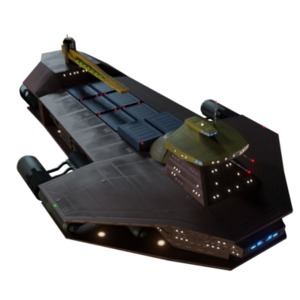Super Transport Freighter: Difference between revisions
(expanded on fuel efficiency vs. 2x LDSFs) |
(Edited fuel efficiency; mentioned 4% difference. Also mentioned it takes fewer turns to build.) |
||
| Line 10: | Line 10: | ||
1. It requires fewer priority points to build, relative to its cargo capacity. | 1. It requires fewer priority points to build, relative to its cargo capacity. | ||
2. It | 2. It requires only 1 turn to build, while for similar cargo capacity you would have to spend 2 turns building 2 LDSFs. Since you want to build a ship every turn, and to minimize wasted turns, this could make the STF desirable for a quick colonizing mission. | ||
3. It | 3. It has about 4% better fuel efficiency when fully loaded compared to two LDSFs combined (fuel consumption relative to cargo size). While this is not a huge difference, when fuel is tight it might matter. | ||
These advantages make the Super Transport useful for long haul missions with a full cargo hold | 4. It survives longer in radiation fields since it has double the crew of the LDSF. | ||
These advantages make the Super Transport useful for long haul missions with a full cargo hold, such as sending many colonists to a distant planet, relatively quickly. | |||
<b>Disadvantages of Super Transport</b> | <b>Disadvantages of Super Transport</b> | ||
1. Its cargo capacity is so huge that you usually will not be | 1. Its cargo capacity is so huge that you usually will not be full, which makes it an inefficient use of an expensive transport. | ||
2. It is less fuel efficient when | 2. It is less fuel efficient when lightly loaded or empty, compared to a single LDSF. | ||
3. It costs 1 more Priority Point to build than LDSF. | 3. It costs 1 more Priority Point to build than LDSF. | ||
Revision as of 00:19, 6 October 2017

Comments
The Super Transport Freighter has the highest cargo capacity of all freighters in the universe and the second highest (after the Merlin Class) of all ships. May be useful if you have a cluster of planets and you want to run a route logistics system instead of hub and spoke.
Built by
All
Hull specs
| Name | Tech | Beams | T/F | En | MC | Dur | Tri | Mol | Mass | Cargo | Fuel | Crew | Abilities | Adv |
|---|---|---|---|---|---|---|---|---|---|---|---|---|---|---|
| Super Transport Freighter | 10 | 0 | 0/0 | 4 | 220 | 125 | 13 | 18 | 160 | 2600 | 1200 | 202 | none | 0 |
Notes
Comparison to Large Deep Space Freighter
Advantages of Super Transport
1. It requires fewer priority points to build, relative to its cargo capacity.
2. It requires only 1 turn to build, while for similar cargo capacity you would have to spend 2 turns building 2 LDSFs. Since you want to build a ship every turn, and to minimize wasted turns, this could make the STF desirable for a quick colonizing mission.
3. It has about 4% better fuel efficiency when fully loaded compared to two LDSFs combined (fuel consumption relative to cargo size). While this is not a huge difference, when fuel is tight it might matter.
4. It survives longer in radiation fields since it has double the crew of the LDSF.
These advantages make the Super Transport useful for long haul missions with a full cargo hold, such as sending many colonists to a distant planet, relatively quickly.
Disadvantages of Super Transport
1. Its cargo capacity is so huge that you usually will not be full, which makes it an inefficient use of an expensive transport.
2. It is less fuel efficient when lightly loaded or empty, compared to a single LDSF.
3. It costs 1 more Priority Point to build than LDSF.
It's usually better to have 2 LDSFs rather than 1 Super Transport. Since an LDSF is adequate for most cargo missions and is about half the cost of a Super Transport, it's better to have two ships in different places at once doing different missions instead of a single ship. If a hostile enemy is around, having two LDSFs means having two targets for the enemy instead of only one, which increases the survivability of your transport fleet.
Addons
Stellar Cartography
- The Super Transport's weak armor prohibits it from entering debris disks.